My previous post was about why we should study writing and written as a response to Elizabeth Wardle and Catherine Savini’s articles. Check it out here!
I had always thought literacy was simply the ability to read and write, but I learned it can go beyond that. A person can speak English, but not be able to really write well in it, or their reading comprehension could be very shoddy. The opposite can be true as well; somebody’s reading and writing skills can be excellent, but they may have a difficult time expressing themselves with their verbal language skills.
James Paul Gee’s “Literacy, Discourse, and Linguistics: Introduction” delves into the nuances of literacy, and teaches a term called “Discourse”. According to Gee, “Discourses are ways of being in the world; they are forms of life which integrate words, acts, values, beliefs, attitudes, and social identities as well as gestures, glances, body positions, and clothes.” Literacy isn’t just the ability to read and write, but also our ability to communicate and to react and perceive our own world; it intertwines itself with our identity and culture.
You can be taught “literacy” as in, you can be taught how to read and write in a classroom over several months or years, but to be taught Discourse isn’t as easy. You have to live in social practice, just like to be able to truly speak like a native in a foreign language, you have to live in the language to be able to pick up the subtleties that learning in a classroom wouldn’t have shown you.
Discourse sounds like a complex academic concept, but I don’t believe it is. If you can understand that there is a difference between learning everything about a language and culture from a textbook, and learning from living and breathing in that language and culture, you already understand what literacy really is, and how Discourse truly works.




Leave a Reply